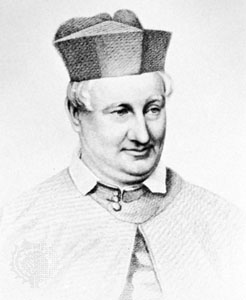by Rev. Fr. Gabriel Lavery, CMRI
(Spring, 2014)

Among the many remarkable events in the life of St. John Bosco, one has an especially important lesson. A sickness had been going around the Oratory and many boys were in bed feeling miserable. The saint walked into the dormitory and said to the boys: “Do you have confidence in the Blessed Virgin Mary?” Naturally, the boys all replied, “Yes.” “Then put your trust in her, get up, go out into the courtyard and join the other boys in recreation.” At these words, some of the boys rose instantly, though they felt miserable. Others remained in bed. When the boys reached the courtyard and began to play, they were instantly cured. On the other hand, the boys who hesitated, tossing in bed, remained sick and continued to suffer through the slow process of getting better. Their devotion to Mary was more on their lips than in their hearts. This leads us to examine our own devotion to her. A good test is to look at how we respond when non-Catholics object to devotion to Mary.
What is our response when Mary is spoken against? Do we respond merely in a negative way, denying that Catholics worship Mary as a god? Do we explain away this devotion, making it seem as if it was really just a small part of our spiritual life, merely a fitting honor given to God’s Mother, rather than a devotion upon which our salvation depends? For example, someone says to us: “Why do you Catholics pray so much to Mary? You treat her as a god. You should go to Jesus instead.” We respond: “Oh, no! We do not treat her as a god. She is a creature, like us. We honor her because she was chosen by God to be His Mother. We do not pray only to her; we go to Jesus too.”
What is our response when Mary is spoken against? Do we explain away this devotion, making it seem as if it was really just a small part of our spiritual life… Where is our burning love for Mary?
Are your answers to questions about Mary leading non-Catholics to downplay her importance in our salvation?
What is wrong with this response? Although the statements are correct, they amount to a mere negative description of devotion to Mary, i.e. what it is not. The answer gives the listener no positive idea of the greatness of Mary and her place in the work of our salvation. The phrases seem carefully worded to minimize as much as possible our devotion to her in order not to cause offense. The one who hears this response goes away thinking: “I see. Now that you’ve explained it, I realize it makes sense. I always thought devotion to Mary meant much more to Catholics. Sure, there are some fanatics who are always saying rosaries and talking about her, but they are just misguided. In itself it is good to honor her.” What have we done? Where is our burning love for Mary? Suppose a man heard his mother falsely accused of some awful crime. Would he content himself with merely denying that she was guilty? No! He would praise all of her virtues and say everything he could to convince others of her goodness and to atone for the insult against her. Yet, when it comes to defending Mary, we are tempted to minimize and make it as acceptable as possible to others, as if we were afraid of what they would think.

How did the saints talk about Mary?
Where is our burning love for Mary? Where is that zeal which made the saints cry out: “O Mother of God, if I place my confidence in thee, I shall be saved. If I am under thy protection, I have nothing to fear, for the fact of being thy client is the possession of a certainty of salvation, which God only grants to those whom he intends to save” (St. John Damascene). “It is impossible that a Mother of God should pray in vain” (St. Antoninus). “It is impossible for any sinner to be saved without the help and favor of the most Blessed Virgin, because those who are not saved by the justice of God are with infinite mercy saved by the intercession of Mary” (St. Ignatius the Martyr). “What, then, will be our lot, Mother, O tender Mother, who are sinners, but desire to change, and have recourse to thee, who art the life of Christians?” (St. Germanus). “In thee, O Lady, have I placed all my hopes; and thus I confidently trust that I shall never be lost, but praise and love thee forever in heaven” (St. Bonaventure).* Would we be ashamed to stand up for Mary in this way when she is spoken against?
The famous theologian and spiritual writer from the 1800’s, Fr. Faber, was one of the most fervent defenders of the great honor due to Mary. Before he converted to the Catholic faith, he was an Anglican minister. He felt increasingly drawn to invoke Mary’s intercession, though he was told it was wrong to pray to her. This created such a struggle in him that he wrote something along these lines: “I hope that Mary will deign to pray for me although I am not allowed to pray to her.” Finally he received the light of faith and was ordained a Catholic priest. In his work as a priest he was saddened by the weakness of Catholics in England who were so afraid of the displeasure of non-Catholics that they seemed anxious to minimize their devotion to Mary as much as possible. On one occasion he began a series of lectures on Mary’s Immaculate Conception. After the first talk was given he received a number of letters objecting to the content. Sadly, these were from Catholics. When the time came for the next sermon, Fr. Faber got into the pulpit and announced that he had received the letters and that the series would be discontinued, “Because,” he said, “I trust I know what is due to my Lady’s honor better than to cast her pearls before swine.” Strong words! Perhaps they sound too strong, but remember, he was speaking to those who called themselves Catholics yet objected to the preaching of Catholic teachings. Is it not a sad state for Catholics when they are offended by the preaching of Catholic teachings simply because, as Fr. Faber remarks elsewhere, these teachings are contrary to “some little favorite anticipations of our own”? (Fr. Faber, The Precious Blood, p. 231).

What are the consequences of weak devotion to Mary?
In his preface to the English translation of St. Louis De Montfort’s True Devotion to Mary, Fr. Faber wrote: “Here, in England, Mary is not half enough preached. Devotion to her is low and thin and poor. It is frightened out of its wits by the sneers of heresy. It is always invoking human respect and carnal prudence, wishing to make Mary so little of a Mary that Protestants may feel at ease about her. Its ignorance of theology makes it unsubstantial and unworthy. It is not the prominent characteristic of our religion which it ought to be. It has no faith in itself. Hence it is that Jesus is not loved, that heretics are not converted, that the Church is not exalted; that souls, which might be saints, wither and dwindle; that the Sacraments are not rightly frequented, or souls enthusiastically evangelized. Jesus is obscured because Mary is kept in the background.”

Would not more non-Catholics be drawn to the Faith if they were made to desire the help of our beautiful, holy, spiritual Mother? How will they be made to love her if the only idea we gave them about her is that she is “not a god”? By all means, let us refute the wrong ideas that non-Catholics have about devotion to Mary, but let us also speak of her with a burning love! Let us preach her virtues, her sinlessness, her power. When someone says God does not need Mary, we can say: “Neither does God need mothers. Why do children depend on their mothers to care for them? Why do mothers feed them, clothe them, and educate them? Why not let God do it? He does not need mothers! No, but He chose to give us mothers; He chose to make them necessary for us, and he gave the mothers all the qualities and powers they needed to do what God called them to do. Just the same He chose to give us a spiritual mother, and He made her so beautiful and good! He chose to come to us through her, to unite her sufferings with His on the Cross, and to give her to us as our Mother from the cross. He gifted her with all the qualities and power which she would need to be our spiritual Mother, especially that great sinlessness and holiness which are such an encouragement and consolation to us poor sinners. What a great sign of God’s love for us! We feel the weight of our unworthiness when we approach Jesus alone, but He loves His Mother and has given her to us so we may obtain through her all we need to get to heaven.” Let us pray, as little Jacinta of Fatima often prayed, that short indulgenced prayer: Sweet Heart of Mary, be my salvation!
* Saints’ quotes taken from St. Alphonsus Liguori, The Glories of Mary, ed. by Eugene Grimm, 4th revised ed. 1931, pp. 224-229.
–Taken from the Reign of Mary Quarterly Magazine, Issue 154

